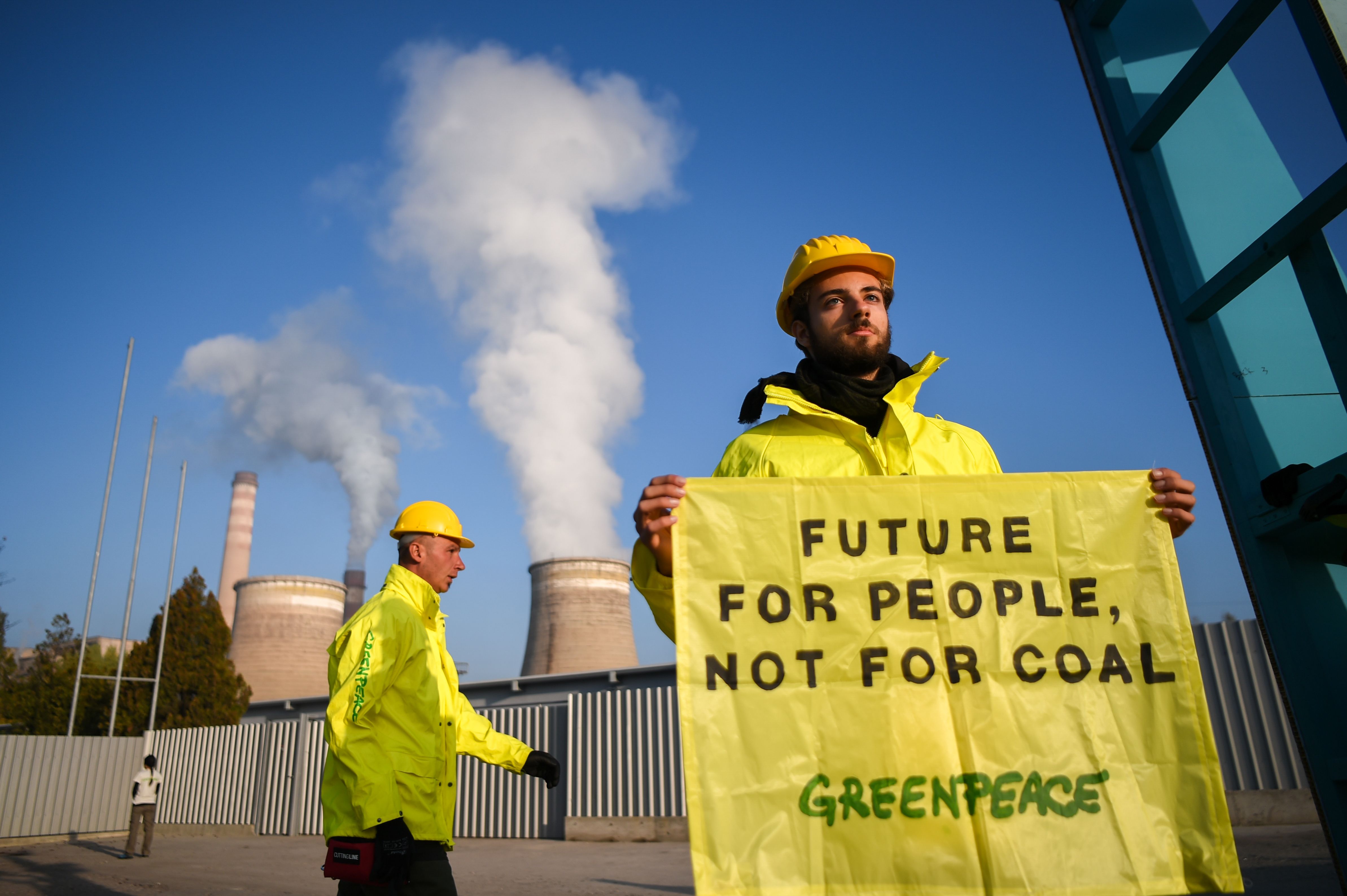Banks gave $1 trillion to groups planning new coal power plants: Report
Sign up now: Get ST's newsletters delivered to your inbox

In a photo taken on Oct 13, 2019, a Greenpeace activist holds a banner in front of the Republika Power Plant, the oldest functioning coal plant in Europe, during a protest calling to phase out coal in the town of Pernik, in Bulgaria.
PHOTO: AFP
Follow topic:
PARIS - Financial institutions have channelled US$745 billion (S$1.01 trillion) over the past three years into companies planning new coal-fired power plants, according to a report by environmental groups, which are urging global banks to stop financing the sector as part of a global effort to combat climate change.
The report by Urgewald, BankTrack and 30 partner non-governmental organisations (NGOs) was released as delegates and world leaders meet in Madrid for a 12-day UN climate summit, where they are expected to hammer out some of the details of the 2015 Paris agreement.
Governments are facing increasing pressure to step up their commitments on fossil fuel reduction after a major UN report last year warned global warming must be capped at 1.5 deg C and the global economy must be "carbon neutral" by 2050 to stay under that threshold.
But the report released by environmental groups on Thursday (Dec 5) cites more than 1,000 new coal power stations or units in the pipeline.
Burning coal is the single largest source of mankind's carbon dioxide (CO2) emissions, which are blamed for heating up the planet and driving more extreme storms, floods, fires and melting of ice caps. Under the 2015 Paris Climate Agreement, nearly 200 nations agreed to limit global warming this century to well below 2 deg C above pre-industrial levels, and aim for 1.5 deg C if possible to cap the damage from catastrophic disruptions to the climate and advancing seas.
A key way to achieving the Paris goals is rapidly switching away from burning highly polluting coal. But with scores of coal plants under construction or planned, meeting the Paris goals seems more remote than ever, especially with global CO2 emissions expected to grow again this year, albeit at a slower rate of 0.6 per cent.
The amount lent to companies planning new plants was calculated using data covering both lending and underwriting between January 2017 and September 2019 for all 258 coal plant developers identified in the Global Coal Exit List, drawn up by the Urgewald and BankTrack groups.
Urgewald is a Germany-based environmental and human rights non-profit organisation, while BankTrack, registered in the Netherlands, is an international NGO that focuses on banks and the activities they finance.
"Most of the top banks providing loans or investment banking services to these companies acknowledge the risks of climate change, but their actions are a slap in the face to the Paris Climate Agreement," said Greig Aitken, climate campaigner at BankTrack.
Since January 2017, a total of 307 commercial banks have provided US$159 billion in direct loans to coal plant developers, with Japanese banks accounting for 32 per cent of direct lending to coal plant developers since 2017, while European banks accounted for 26 per cent of loans.
The top three lenders listed are the Japanese banks Mizuho, Mitsubishi UFJ Financial Group and the Sumitomo Mitsui Banking Corporation. These are followed by US giant Citigroup and France's BNP Paribas.
The three Japanese mega banks together provided US$39.3 billion in loans to coal plant developers between 2017 and 2019, the report says, with some of the financing going towards controversial coal-fired power stations in Vietnam and Indonesia.
"Japan's top three banks are undermining the Paris Agreement and tarnishing their reputations as the world's biggest lenders to coal plant developers," said Shin Furuno of US-based non-profit 350.org.
"Global banks must align their portfolios with the Paris climate goals by ending finance for the coal sector altogether and actively funding the transition towards a zero-carbon future."
Japan's Government Pension Investment Fund is ranked the second-biggest investor in the world in the top coal plant developers, with total combined shareholdings and bond holdings worth US$17.4 billion. Global asset manager Blackrock is the No. 1 investor to the coal industry with US$17.6 billion in holdings, while US investment manager Vanguard comes in at No. 3 at US$12.4 billion.
Since January 2017, a total of 300 commercial banks have channelled over US$585 billion to coal plant developers through underwriting, such as raising capital for companies by issuing bonds and shares and selling them to investors.
"Chinese financial institutions round out all the top 10 underwriters, with Japan's Mizuho 11th biggest underwriter of coal," 350.org noted in a statement.
Chinese banks accounted for 69 per cent of underwriting for coal plant developers since January 2017.
The world's top five underwriters alone provided more than US$130 billion in underwriting services to coal plant developers from 2017 to 2019. They are Industrial and Commercial Bank of China (ICBC), Ping An Insurance Group, CITIC, Bank of China and Shanghai Pudong Development Bank.
"Alongside Japan, China's outsized influence on global coal development cannot be denied and there are significant concerns its Belt and Road Initiative will involve additional coal plant capacity in developing countries," 350.org said.
With additional reporting by Agence France-Presse

